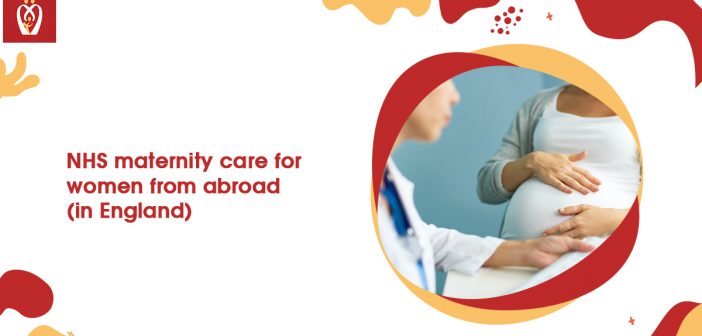This article explains how women from other countries can get free NHS (antenatal care) maternity care in England (or citizens of the UK returning to England after living overseas).
Is it possible for me to receive free NHS maternity care?

The NHS provides free maternity care to women who are;
- regarded as ‘ordinarily resident in the UK or
- exempt from charges (including people who have paid the health surcharge).
Unless you belong to one of these statuses, you may be asked to pay for your care; however, you cannot be denied care if you cannot pay when you receive it. Even if you cannot pay, it is important for your health and your baby’s health that you seek maternity care. All antenatal, birth and postnatal care are included in maternity care.
Who will decide if I will be charged for my maternity care?
All NHS hospitals must conduct a reasonable inquiry to decide who is not ordinarily resident and charge overseas visitors for NHS care. Overseas Visitors Managers (OVM) at the hospital will typically handle this. According to government guidance on charging for NHS care, hospitals should take the following steps:
- Patients should be asked if they have health insurance from another country.
- The test for ordinary residents in the UK must be applied to all patients. If the patient passes the criteria, they should not be charged.
- Patients without insurance coverage from another country and not ordinarily resident in the UK must be evaluated for exemptions.
- Patients who must be charged. If you cannot pay in advance, your maternity care should not be withheld or delayed.
Do I have to pay the fees in advance?
No. There are no upfront fees for maternity care. Your maternity care should never be refused or delayed if you cannot pay for it in advance.
Is there anything in my NHS records that suggests whether I have to pay for care? | antenatal care
Hospitals are responsible for placing a ‘flag’ on a patient’s record stating whether the patient is chargeable or exempt, as well as the date they made that decision. Before charging a patient, the NHS is instructed to carry out “reasonable inquiries.” This duty applies every time the NHS charges you for your treatment. If your residence status or immigration status changes, you must provide the NHS with new documentation.
The ordinary residence test
Who is ‘ordinarily resident in the UK?
Individuals regarded as ‘ordinarily resident in the United Kingdom are entitled to free NHS care. In law, a person is considered to be a resident here if they are:
Living lawfully in the UK voluntarily and for established purposes, for the time being, whether for a short or long period.
I am not a UK Citizen. Am I ordinarily resident?
People who need leave to remain in the UK must have indefinite leave to remain (ILR) under the 2015 charging regulations to be considered ordinarily resident.
Even if you have ILR, you must be able to show that you are ordinarily resident in the country and not just visiting.
If you are in the United Kingdom on a short-term visa (for example, a spouse or student visa), you cannot be considered ordinarily resident, even if you have been here for more than 6 months and can establish that you are settled. However, if you qualify for one of the exemptions listed below or pay the health surcharge when renewing your visa, you may not have to pay for NHS maternity care.
If you have overstayed your visa or made an asylum claim and any subsequent appeals have been denied, you will be considered living unlawfully in the UK. Still, you may not have to pay for NHS maternity care if you are covered by one of the exemptions listed below.
EEA/EU nationals
Anyone who needs these services is free of charge, regardless of immigration or residency status. The NHS may ask for reimbursement from another EEA country if you are an EEA national, but you will not be charged.
The following services may not be charged for:
- Accident and emergency (A&E) services are provided until the patient is admitted as an inpatient. A&E services provided during an outpatient appointment are billed.
- A service provided outside of an NHS hospital, unless the staff provides the service on behalf of an NHS hospital
- Services for family planning (not including pregnancy termination). As long as the abortion is needed before you return home, temporary EEA nationals can use their EHICs to terminate a pregnancy.
- Diagnosis and treatment of contagious diseases such as tuberculosis and HIV
- Sexually transmitted infection diagnosis and treatment
- Treatment for a mental or physical disorder caused by torture, female genital mutilation (FGM), sexual violence, or domestic violence when the patient has not traveled to the UK for treatment.
What will the cost of maternity care be? | antenatal care

The amount will be determined by the level of care needed for you and your baby. Charges can depend on a local price system or the National Tariff Payment System, with visitors from other countries being charged 150% of the cost. Maternity care is divided into three categories: antenatal care, birth care, and postnatal care; approximate charges for these services begin at £7,500.
If you are in the early stage of pregnancy in the UK but plan to have your baby elsewhere, you should only be charged for the care that you actually receive. Hospitals can charge in three ways: for the entire package, a portion of a package, or per appointment.
If you are asked to pay, request an itemized bill so you can see exactly what you have been charged for. Please contact the hospital’s Overseas Visitors Manager if you disagree with the amount charged. You can also speak with the OVM about repayment options (for example, whether you can set up a repayment plan), and you should seek advice if necessary.
What should I do if I’m asked to pay but cannot?
You should notify the hospital if you cannot pay for your maternity care. This should ideally be done in writing. You can request that the debt be repaid in monthly installments. Your income and expenses should determine the amount you pay, so even a small monthly payment (for example, £5) should be accepted if you can afford only that.
Hospital trusts have a responsibility to recover charges, but they should not pursue charges beyond what is reasonable. If a debt collector or the trust is pursuing payment aggressively, you can file a formal complaint with the trust.
According to government charging guidance, NHS staff must not discriminate when implementing charging rules, such as targeting specific racial groups. It is also your right not to be intimidated, hostile, degrading, or offensively treated. This means that inquiries about your residency status and payment should be made in private and in a discrete manner. If you have been discriminated against or unfairly treated, you can file a complaint.
About Nurturey
Nurturey PinkBook is the best “digital substitute” for the NHS Red Book. The PinkBook allows parents and pregnant women to access their child’s health records, get reliable information about their pregnancy stage, and view upcoming NHS health checkups.
If you have troubles with your pregnancy, use the Nurturey pregnancy app to schedule an appointment with your GP/midwife as soon as possible. You can also make appointments, communicate with your doctor, and get prescription refills.







